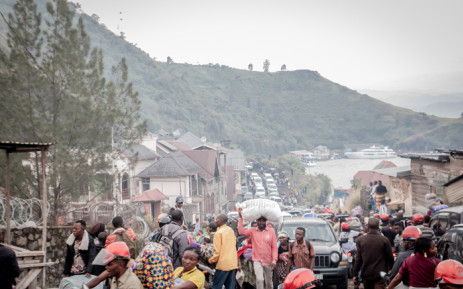DR CONGO CITY EMPTIES OVER FEARS VOLCANO COULD ERUPT AGAIN
Goma, located on the shore of Lake Kivu, has been gripped by fear since Africa's most active volcano erupted on Saturday, leaving 32 people dead.

Goma, located on the shore of Lake Kivu, has been gripped by fear since Africa's most active volcano erupted on Saturday, leaving 32 people dead.
Scientists monitoring the volcano have warned of a potentially catastrophic scenario - a "limnic eruption" that could smother the area with suffocating carbon dioxide.
Goma was bizarrely quiet early on Friday after the authorities ordered a "preventative" evacuation, triggering an exodus that choked roads out of the city.
All the shops were closed and just a handful of people and some motorcycle taxis were on the streets.
Security guards were deployed around the local mansions, their windows shuttered, on the shore of the lake.
A few families were seen leaving the city on foot, bags of belongings on their heads, with their children holding hands. There was no special deployment of police or military personnel.
QUIETER NIGHT
Local volcanologists recorded hundreds of aftershocks after Nyiragongo, which lies just a dozen kilometres from Goma, roared back to life last Saturday.
But tremors eased overnight, both in numbers and intensity, an AFP journalist said.
Experts have been carrying out a risk assessment at the volcano's summit, the government says.
General Constant Ndima, the military governor of North Kivu province, ordered the evacuation of districts that potentially applies to nearly 400,000 out of Goma's 600,000 residents, according to an estimate by the UN humanitarian agency OCHA.
The wider Goma area has a population of around two million people.
"Right now we can't rule out an eruption on land or under the lake, which could happen very soon and without warning," Ndima said.
The authorities arranged transport towards Sake, around 25 kilometres west of Goma, he added.
Tens of thousands of people had fled Goma after Nyiragongo kicked into life on Saturday night but many then returned when the eruption ended the following day.
The volcano spewed out two rivers of molten rock, one of which came to halt on the edge of Goma after obliterating villages in its wake.
OCHA said more than 4,500 homes were destroyed, affecting some 20,000 people.
'LIMNIC' RISK
The worst-case scenario is of an eruption occurring both from the flanks of the volcano and under the floor of Lake Kivu.
An eruption under the lake could release hundreds of thousands of tonnes of carbon dioxide (CO2) that are currently dissolved in the water's depths.
This gas would rise to the surface of the lake, forming a huge invisible cloud that would displace oxygen, asphyxiating life.
In 1986, one of these so-called limnic eruptions killed more than 1,700 people and thousands of cattle at Lake Nyos in western Cameroon.
A so-called strato-volcano nearly 3,500 metres high, Nyiragongo straddles the East African Rift tectonic divide.
Its last major eruption, in 2002, claimed around 100 lives.
The deadliest eruption on record killed more than 600 people in 1977.
TROUBLED REGION
The latest episode adds to the many woes in the east of the vast Democratic Republic of Congo, a country the size of the continental western Europe.
Scores of armed groups roam the east, many of them a legacy of two regional wars that ran from 1996 to 2003.
At least 26 people were killed earlier this week in the Beni region in an attack attributed to the notorious Allied Democratic Forces (ADF), which the US says is linked to the so-called Islamic State group.
https://ewn.co.za/2021/05/28/dr-congo-city-empties-over-fears-volcano-could-erupt-again

No comments:
Post a Comment